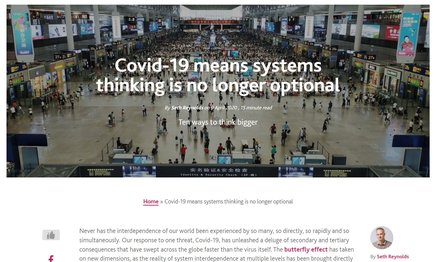
Never has the interdependence of our world been experienced by so many, so directly, so rapidly and so simultaneously. Our response to one threat, Covid-19, has unleashed a deluge of secondary and tertiary consequences that have swept across the globe faster than the virus itself. The butterfly effect has taken on new dimensions, as the reality of system interdependence at multiple levels has been brought directly into our homes and news feeds:
Individually, an innocuous bus journey sends a stranger to intensive care in a fortnight
Societally, health charities are warning that actions taken in response to one health crisis – Covid-19 – could lead to up to 11,000 deaths of women in childbirth around the world because of another – namely, 9.5m women not getting access to family planning intervention.
Governmentally, some systemic consequences of decision-making are there for all to see, while others are less immediately apparent – for example, Trump’s false proclamation of testing availability “for anyone that wants one” ended up actually reducing the availability of tests by immediately increasing demand. It even reduced the already scarce supply of protective masks, which must be disposed of after testing.
